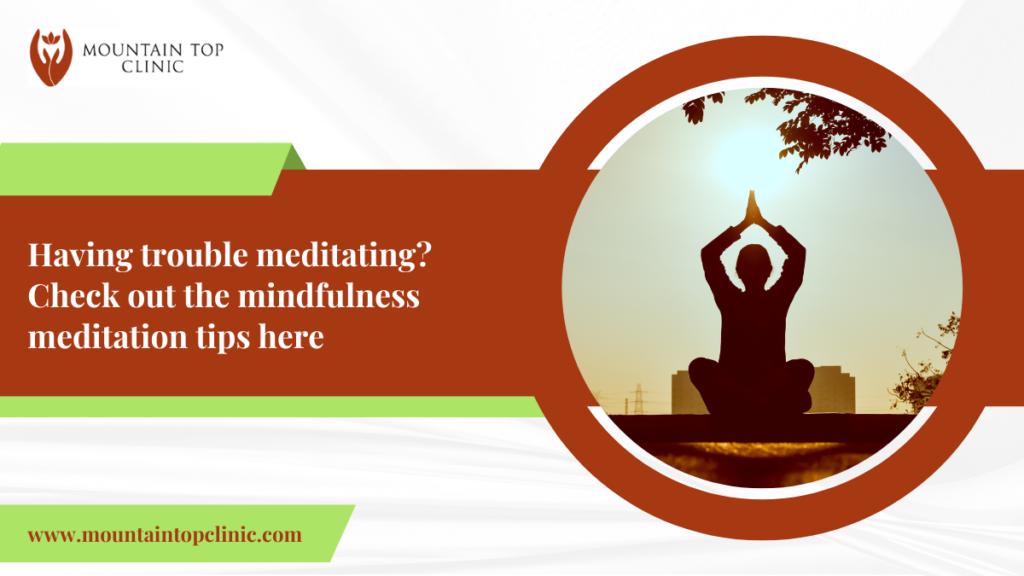
Meditation is not a new practice and has been around since ancient times. Millions of people have resorted to meditation to calm their minds, achieve inner peace, improve their focus, and derive other health benefits. If practiced right, meditation might lead to both mental and physical well-being.
If you have too much stress, meditation can be the key to unlocking the calmness that your mind is craving. However, for beginners, practicing meditation might seem like an uphill task, and some even give up in frustration midway as they struggle to control their thoughts. Here we have put together some mindfulness meditation tips that might help you be consistent with your meditation practice so that you can derive these benefits.
What are some mindfulness meditation tips?
Before we start exploring the tips we need to understand what mindfulness meditation is. Mindfulness meditation is a technique that helps train the mind so that your focus shifts from random racing thoughts to “now” or, the moment you are in; this practice also helps in blocking negativity and has a calming effect on your mind, and body. This practice can be great for increasing your focus and keeping your stress level down.You should visitan Ayurvedic wellness retreat to enjoy a healing mindfulness meditation session to rejuvenate your mind once in a while.
Now that we have learned what mindfulness meditation is all about, let’s check out the tips here.
Mindfulness meditation tips:
Be comfortable:
The first tip would be to choose a comfortable place for meditation. Find a room, or even a corner in a room, where you can sit and meditate without any distraction. You can also create your comfortable meditation nook in a room. It does not have to be inside your home; it could be a spot in your garden, balcony, or even a secluded space in the park. Any place that makes you feel comfortable will do, and you should also choose comfortable clothes for your meditation session.
Adjust the room temperature if needed; the light in the room should be mellow and not too bright. The idea here is to let your mind be comfortable instead of adding more worries to its list. Meditation is a part of yoga, and if you partake in yoga training in the Nilgiris or elsewhere, you would be required to practice meditation to calm your mind post the yoga sessions.
Set the time:
You must decide how much time you are willing to dedicate to your mindfulness meditation session. If you haven’t tried meditation before, then start small. When you begin with a goal of meditating for 30 minutes at a stretch and fail, it becomes a frustrating and demotivating experience for you.
Be pragmatic, start with a 5-10 minute session, and keep at it for a while until your mind gets used to it. The trick here is to practice meditation at the same time every day. Soon you will be able to stretch the minutes to complete a 30 minute session. However, set a soothing alarm before you start the session, as it will help you stay focused without worrying about how much time has passed. Attend a meditation session in an Ayurvedic wellness retreat to learn meditation techniques.
Choose a comfortable position:
Whenever we think of meditation, our mind immediately conjures up the cross-legged position. Getting this pose right and staying in this pose throughout your meditation session might not be possible for all. If you are uncomfortable, your mind will not stay focused for long. Find a comfortable position for your session; it will help you relax your body and mind. You can sit on the floor or, even on a sofa in an upright position, and do not slouch. If you undergo yoga training in the Nilgiris, you can not only learn the ideal meditation posture, but you will also learn about the significance of different postures there.
Focus on breathing:
Now that our body is relaxed and comfortable, it is time to shift our focus to the mind. Focus on your breathing instead of focusing on random thoughts. Observe the rhythm of breathing, and do not quicken your pace. It will gradually calm your mind, and with practice you will notice that you are no longer paying attention to the random thoughts during your mindfulness meditation sessions. Do not experiment with your breathing technique or try to control it in a way that might disrupt the natural rhythm of breathing.
Ignore random thoughts:
As you sit down to meditate, random thoughts might race through your mind distracting you in no time. Negative thoughts will be harder to deal with, but you must learn to let the thoughts pass by. Do not try to stem the flow of your thoughts; let the thoughts come and go without actively engaging with them. Your focus should only be on your breathing. Do not start with the expectation that you will control your thoughts from day 1;with practice you can gradually master the art of blocking negative thoughts. Being pragmatic with your approach and having patience will help you achieve success in the long run.
Conclusion: These mindfulness meditation tips will help you be skilled in no time. Do not set unrealistic goals, and be ready to embrace the fact that it takes practice to master meditation techniques. Start your mindfulness meditation journey today and get ready for a transformation.

